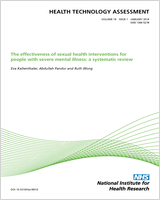Included under terms of UK Non-commercial Government License.
NCBI Bookshelf. A service of the National Library of Medicine, National Institutes of Health.
Nyssen OP, Taylor SJC, Wong G, et al. Does therapeutic writing help people with long-term conditions? Systematic review, realist synthesis and economic considerations. Southampton (UK): NIHR Journals Library; 2016 Apr. (Health Technology Assessment, No. 20.27.)

Does therapeutic writing help people with long-term conditions? Systematic review, realist synthesis and economic considerations.
Show detailsTechnical terms, abbreviations and/or acronyms are used throughout this report with definitions provided. In some cases, usage may differ in the literature, but the term has a constant meaning throughout this review.
- Context
In realist synthesis, context refers to the backdrop of programmes and research. As these conditions change over time, the context may reflect aspects of those changes while the programme is implemented. Context can be broadly understood as any condition that triggers and/or modifies the behaviour of a mechanism.
- Facilitated therapeutic writing
Writing activities involving a facilitator, such as a trained writing practitioner or a psychologist. It may be a group activity or one to one, and can be delivered face to face or remotely, for example over the web.
- Mechanism
In realist synthesis, mechanisms are underlying entities, processes or structures, which operate in particular contexts to generate outcomes of interest. Mechanisms (1) are usually hidden; (2) are sensitive to variations in context; and (3) generate outcomes.
- Positive writing
Involves writing about positive experiences such as events that stimulated happiness or joy and it may be facilitated or unfacilitated.
- Programme theory
In realist synthesis, the term programme theory refers to an abstracted description and/or diagram that lays out what a programme (or family of programmes or interventions) comprises and how it is expected to work.
- Unfacilitated emotional writing
Also known as unfacilitated expressive writing or written emotional disclosure, a type of unfacilitated therapeutic writing, as described by Pennebaker and Beall (Pennebaker JW, Beall SK. Confronting a traumatic event: towards an understanding of inhibition and disease. J Abnorm Psychol 1986;95:274–81) or a variant thereof.
The trauma–emotion subjects were asked to write about a personally upsetting experience and to describe the feelings they had about the experience. It was emphasized that they were to write only about their feelings, with no mention of what actually happened.
- Glossary - Does therapeutic writing help people with long-term conditions? Syste...Glossary - Does therapeutic writing help people with long-term conditions? Systematic review, realist synthesis and economic considerations
Your browsing activity is empty.
Activity recording is turned off.
See more...